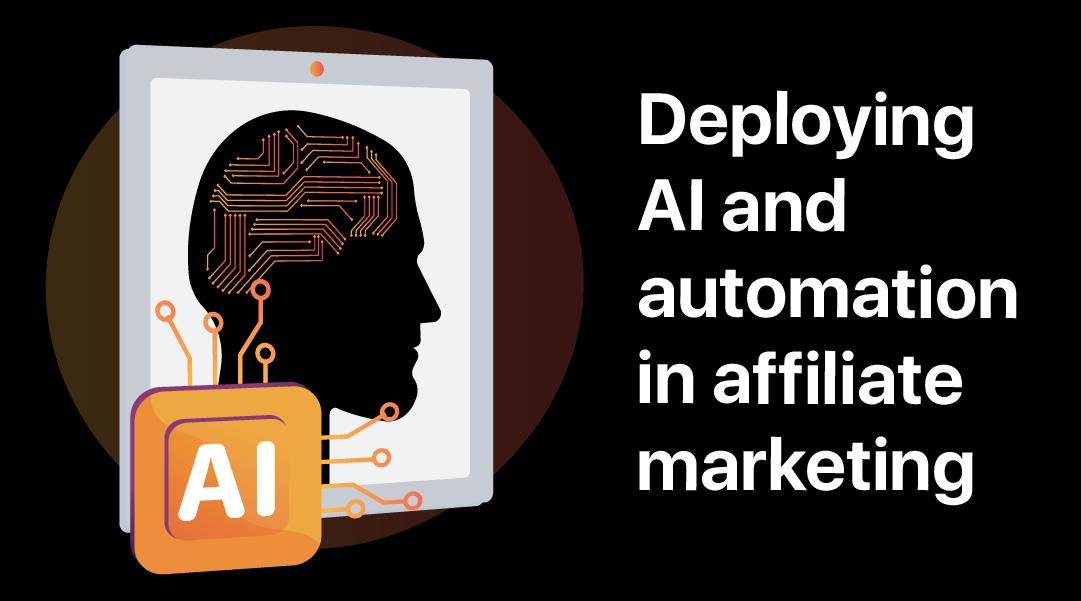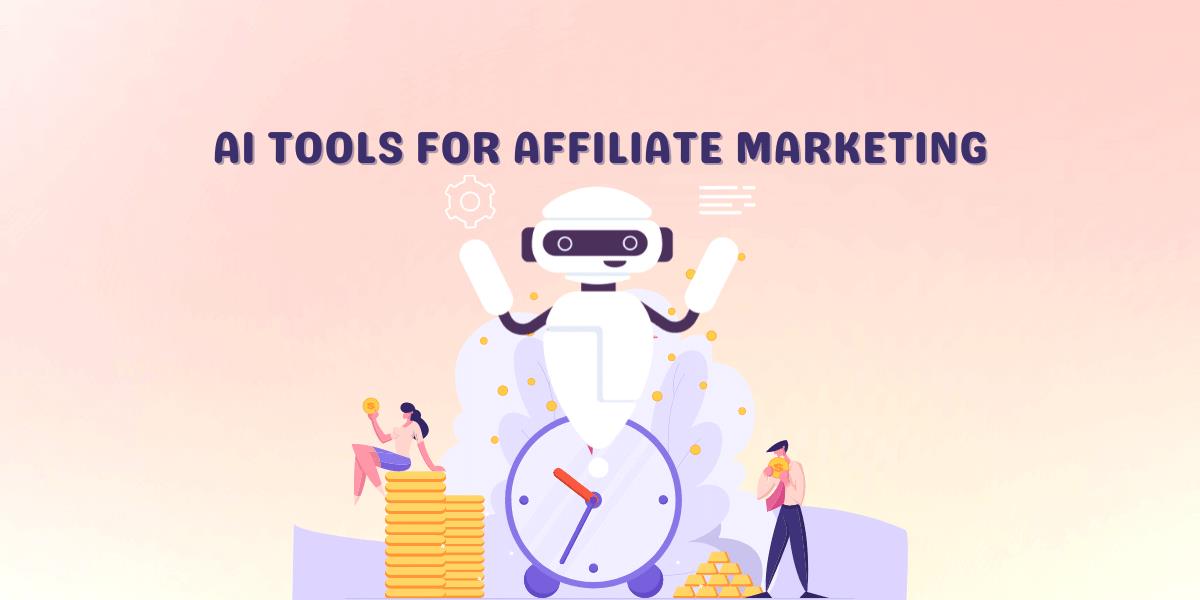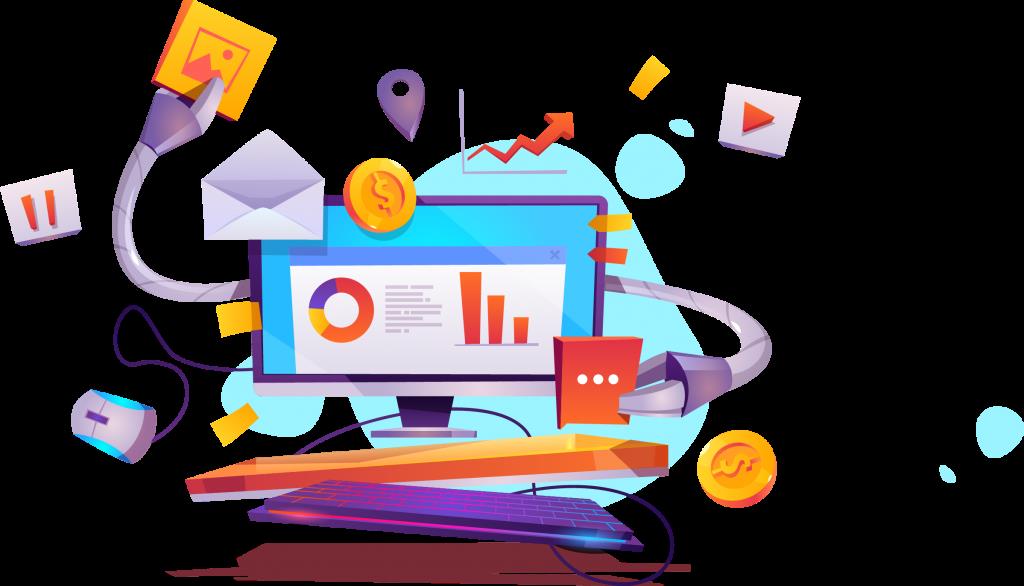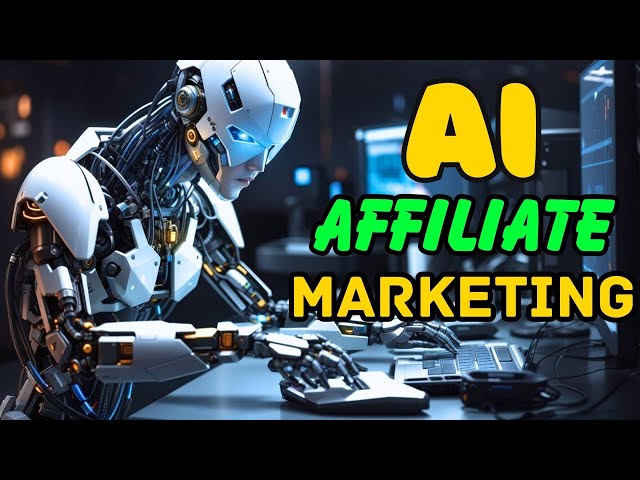
In the rapidly evolving landscape of affiliate marketing, harnessing the power of artificial intelligence (AI) has become essential for driving success and achieving optimal results.
This article explores the top 10 strategies for leveraging AI to enhance affiliate marketing campaigns.
From utilizing predictive analytics to personalizing marketing efforts and implementing AI-powered chatbots, these strategic approaches offer a results-oriented and data-driven approach to achieving affiliate marketing success.
By embracing AI technologies, marketers can optimize their campaigns, enhance customer experiences, and drive targeted audience engagement.
Leveraging Ai-Powered Recommendation Engines
By leveraging AI-powered recommendation engines, businesses can significantly enhance their customer experience by delivering personalized product suggestions based on individual preferences and browsing history. AI-powered product recommendations not only improve customer satisfaction but also drive higher conversion rates and increase revenue.
These recommendation engines analyze vast amounts of data, including customer behavior, purchase history, and demographic information, to generate accurate and relevant suggestions. By understanding customers' preferences and interests, businesses can tailor their promotions and marketing campaigns to create a personalized experience that resonates with their target audience.

AI-driven personalized promotions enable businesses to deliver the right message to the right customer at the right time, leading to higher engagement and ultimately, more conversions. With AI-powered recommendation engines, businesses can unlock new opportunities for growth and create a seamless customer journey that fosters loyalty and drives success.
Using Predictive Analytics to Optimize Affiliate Campaigns
To maximize the effectiveness of affiliate campaigns, businesses can leverage predictive analytics to identify key trends and optimize their strategies. Predictive analytics uses historical data, statistical algorithms, and AI-powered models to forecast future outcomes. By analyzing past affiliate campaigns and customer behavior, businesses can gain valuable insights into what drives affiliate commission and which strategies yield the best results.
With predictive analytics for affiliate commission, businesses can identify the most profitable affiliate partners, optimize commission structures, and allocate resources to the most promising campaigns. By understanding which products or services are in high demand and which marketing channels are most effective, businesses can make data-driven decisions to drive affiliate marketing success.
AI-powered campaign optimization takes this a step further by automating the optimization process. Machine learning algorithms can continuously analyze data, identify patterns, and make real-time adjustments to affiliate marketing strategies. This results in more targeted and personalized campaigns, higher conversion rates, and increased revenue.
Implementing Ai-Powered Chatbots for Customer Support
Companies are increasingly incorporating AI-powered chatbots for customer support, frequently enhancing their ability to provide efficient and personalized assistance. These chatbots utilize artificial intelligence algorithms to analyze customer queries, understand their intent, and provide relevant responses in real-time. By leveraging natural language processing and machine learning capabilities, AI-powered chatbots can handle a wide range of customer inquiries, freeing up human agents to focus on more complex tasks.
Moreover, these chatbots can continuously learn from customer interactions, improving their performance over time. In addition to customer support, AI-driven chatbots can also play a crucial role in sales forecasting and lead generation. By analyzing customer data and patterns, these chatbots can identify potential sales opportunities and provide targeted recommendations.
This not only helps businesses increase their sales revenue but also enhances the overall customer experience.

Personalizing Affiliate Marketing Efforts With Ai-Driven Data Insights
Personalizing affiliate marketing efforts with AI-driven data insights allows businesses to enhance their targeting capabilities, resulting in increased conversion rates and improved customer engagement.
By leveraging AI technology to analyze customer data and behavior patterns, companies can gain valuable insights into their target audience's preferences and tailor their marketing strategies accordingly.
This personalized approach not only increases the likelihood of conversions but also fosters a stronger connection with customers, leading to long-term loyalty and higher customer lifetime value.
Enhanced Targeting Capabilities
How can AI-driven data insights enhance targeting capabilities in affiliate marketing efforts?
As the digital landscape continues to evolve, the need for increased ad visibility and personalized ad targeting becomes paramount. Leveraging AI-driven data insights can significantly enhance targeting capabilities in affiliate marketing efforts.
Here are four ways AI can achieve this:
Advanced segmentation: AI algorithms can analyze vast amounts of customer data to identify patterns and segment audiences based on demographics, interests, and behaviors.

Predictive analytics: By analyzing historical data, AI can predict customer behavior and preferences, enabling marketers to target their ads more effectively.
Real-time optimization: AI can continuously monitor and analyze campaign performance, making real-time adjustments to optimize targeting and maximize conversions.
Personalized recommendations: AI can analyze customer behavior and provide personalized product recommendations, increasing the chances of conversion.
Increased Conversion Rates
Implementing AI-driven data insights can optimize targeting and increase conversion rates in affiliate marketing efforts. By leveraging AI technologies, marketers can gain valuable insights into customer behavior, preferences, and purchasing patterns.
These insights can then be used to identify high-potential leads and deliver personalized messages that resonate with their specific needs and interests. AI-powered algorithms can also optimize conversion funnels by analyzing data in real-time and identifying areas of improvement.
This allows marketers to make data-driven decisions and refine their strategies to maximize conversions. The result is increased revenue generation and higher ROI for affiliate marketing campaigns.
With AI, marketers can unlock the full potential of their data and drive better results, ultimately leading to greater success in the competitive landscape of affiliate marketing.

Improved Customer Engagement
By leveraging AI-driven data insights, marketers can enhance customer engagement by tailoring their affiliate marketing efforts to resonate with the specific needs and interests of their target audience. This approach enables marketers to deliver personalized recommendations and offers that are more likely to result in increased customer satisfaction.
Here are four key strategies for driving affiliate marketing success with AI:
Data Analysis: Utilize AI algorithms to analyze customer data and identify patterns and preferences, allowing marketers to deliver more targeted and relevant content.
Predictive Modeling: Implement predictive modeling techniques to anticipate customer behavior and proactively tailor marketing efforts to meet their needs.
Real-time Optimization: Use AI technology to optimize affiliate marketing campaigns in real-time, ensuring that messaging and offers remain relevant and engaging.
Automation: Leverage AI automation tools to streamline and scale affiliate marketing efforts, freeing up marketers to focus on strategy and creativity.
Harnessing the Power of AI for Targeted Audience Segmentation
Harnessing the power of AI for targeted audience segmentation is a strategic approach that allows businesses to achieve precise targeting, enhanced audience segmentation, and maximum marketing effectiveness.

By leveraging AI algorithms and machine learning capabilities, organizations can analyze vast amounts of data to identify specific customer segments and understand their preferences, behaviors, and interests.
This enables marketers to deliver personalized and relevant messages, optimize their marketing strategies, and ultimately drive better results and ROI.
AI for Precise Targeting
With the advancement of artificial intelligence, marketers can now utilize cutting-edge algorithms to achieve precise targeting, ensuring their messages reach the right audience at the right time. This level of precision targeting is made possible through AI-driven optimization, which analyzes vast amounts of data to identify patterns and trends that can inform marketing strategies.
Here are four key benefits of AI-driven precision targeting:
Enhanced customer segmentation: AI algorithms can analyze customer data in real-time, allowing marketers to create highly specific customer segments based on demographics, behavior, and preferences.
Personalized messaging: By leveraging AI, marketers can deliver personalized messages to individual customers, increasing the likelihood of engagement and conversion.
Improved campaign performance: AI-powered optimization can continuously monitor and adjust marketing campaigns, maximizing their effectiveness and ROI.

Efficient resource allocation: AI algorithms can identify the most promising channels and platforms for targeting specific audiences, ensuring marketers allocate their resources wisely.
Enhanced Audience Segmentation
Utilizing AI-driven algorithms, marketers can now achieve enhanced audience segmentation, allowing them to tailor their messaging to specific customer segments based on demographics, behavior, and preferences. This advanced level of segmentation enables marketers to deliver targeted messaging that resonates with their audience, ultimately leading to improved campaign performance.
By leveraging AI algorithms, marketers can analyze vast amounts of data to identify patterns and trends within their customer base. This data-driven approach allows them to understand their audience on a deeper level, enabling them to create highly personalized and relevant campaigns.
The benefits of enhanced audience segmentation are significant. Marketers can optimize their marketing efforts by delivering the right message to the right people at the right time. This level of precision ensures that marketing budgets are used efficiently and effectively, maximizing ROI.
Maximize Marketing Effectiveness
To achieve maximum marketing effectiveness, marketers can leverage the power of AI to precisely segment their target audience based on demographics, behavior, and preferences, ultimately leading to more impactful and successful campaigns. Here are four key ways AI can help maximize marketing effectiveness:
Improved targeting accuracy: AI algorithms can analyze vast amounts of data to identify patterns and trends, enabling marketers to target their campaigns with precision. This ensures that the right message reaches the right audience at the right time, increasing the likelihood of conversions and maximizing ROI.
Personalization at scale: AI-powered tools can create personalized experiences for each individual customer, even when dealing with large volumes of data. By tailoring messaging and offers to specific preferences and behaviors, marketers can create more meaningful connections and drive higher engagement.

Real-time optimization: AI can analyze campaign performance in real-time, allowing marketers to quickly identify what is working and what isn't. This enables them to make data-driven decisions and optimize their campaigns on the fly, maximizing ROI and minimizing wasted resources.
Predictive analytics: AI can use historical data and machine learning algorithms to predict future customer behavior and preferences. By leveraging these insights, marketers can anticipate customer needs, deliver targeted messaging, and stay one step ahead of the competition.
Automating Affiliate Program Management With AI Algorithms
The implementation of AI algorithms allows for the automation and streamlining of affiliate program management, resulting in increased efficiency and improved performance.
AI algorithms can be used to automate commission tracking, eliminating the need for manual tracking and reducing the risk of errors.
By analyzing data from various sources, AI algorithms can accurately calculate and optimize payouts, ensuring that affiliates receive their fair share of commissions.
This automation not only saves time and resources but also allows for quicker and more accurate payouts, enhancing the overall affiliate experience.
Furthermore, AI algorithms can provide valuable insights and recommendations for program optimization, such as identifying top-performing affiliates and optimizing commission structures.

Utilizing Ai-Driven Content Optimization Strategies
Utilizing AI-driven content optimization strategies can significantly impact the effectiveness of digital marketing efforts.
By leveraging AI algorithms, businesses can analyze and understand customer preferences, allowing them to optimize their content to better resonate with their target audience.
This not only increases engagement but also improves conversion rates, leading to enhanced results and a competitive edge in the market.
Ai's Impact on Content
Artificial intelligence is revolutionizing the creation and delivery of content, enhancing its relevance and engagement. This transformative technology is reshaping the way content is generated and curated, providing numerous benefits for businesses and consumers alike.
Here are four key ways AI is impacting content:
Personalization: AI enables content creators to tailor their messages to individual preferences, delivering a more personalized and targeted experience for users.
Automation: AI-powered algorithms can automate the content creation process, saving time and resources for businesses while maintaining quality and consistency.

Analytics: AI tools can analyze vast amounts of data to gain insights into consumer behavior and preferences, allowing content creators to optimize their strategies for maximum impact.
Recommendation systems: AI algorithms can curate content recommendations based on user preferences, improving user experience and driving engagement.
With AI's advancements in content generation and curation, businesses can create more relevant and engaging content, ultimately leading to higher customer satisfaction and success.
Optimizing With AI
By harnessing the power of AI, businesses can leverage data-driven insights to enhance their content optimization strategies and achieve greater levels of efficiency and effectiveness.
AI has already made significant strides in transforming various aspects of business, including customer service and email marketing.
In customer service, AI-powered chatbots can handle routine inquiries, freeing up human agents to focus on more complex issues. These chatbots can provide personalized responses based on customer data, improving the overall customer experience.
In email marketing, AI can analyze customer behavior and preferences to deliver targeted and relevant content, resulting in higher open rates and conversions.

Benefits of AI
In today's digital landscape, businesses are increasingly embracing the benefits of AI in driving their content optimization strategies and achieving higher levels of success. AI offers numerous advantages that can greatly improve efficiency and increase profitability.
Here are four key benefits of incorporating AI into your business:
Enhanced personalization: AI algorithms analyze vast amounts of customer data to deliver personalized content and recommendations, resulting in improved customer satisfaction and increased conversion rates.
Real-time data analysis: AI-powered tools can process and analyze large volumes of data in real-time, allowing businesses to make informed decisions and respond quickly to market trends.
Streamlined operations: AI automates repetitive tasks, freeing up time for employees to focus on more strategic activities. This leads to improved operational efficiency and cost savings.
Predictive analytics: AI algorithms can predict customer behavior and market trends, helping businesses make proactive decisions and stay ahead of the competition.
Enhancing Affiliate Tracking and Attribution With AI Technologies
How can AI technologies be leveraged to enhance affiliate tracking and attribution?

AI technologies have the potential to revolutionize the way affiliate marketing campaigns are tracked and attributed. By leveraging AI algorithms and machine learning, marketers can improve campaign tracking and optimize commission structures to drive better results.
AI can analyze vast amounts of data to identify patterns and trends, enabling marketers to make data-driven decisions and allocate resources more effectively. It can also enhance attribution models, providing a more accurate understanding of the contribution of each affiliate to the overall campaign performance.
With AI, marketers can identify high-performing affiliates, optimize commission structures based on performance, and even predict future performance to drive better ROI. By harnessing the power of AI technologies, marketers can unlock new levels of efficiency and effectiveness in their affiliate marketing strategies, ultimately leading to greater success and freedom.
Applying Ai-Powered Sentiment Analysis for Effective Affiliate Marketing
Utilizing AI-powered sentiment analysis can enhance the effectiveness of affiliate marketing by providing insights into customer emotions and preferences, allowing marketers to tailor their strategies accordingly. With the rise of influencer marketing and social media advertising, AI-powered sentiment analysis becomes a powerful tool to optimize affiliate marketing campaigns.
Here are four ways that AI-driven sentiment analysis can drive success in affiliate marketing:
Identifying customer sentiments: AI-powered sentiment analysis can analyze customer feedback and social media posts to understand customer sentiments towards products or brands, helping marketers target the right audience.
Personalizing marketing messages: By analyzing customer sentiments, AI can provide marketers with valuable insights to create personalized marketing messages that resonate with their target audience, increasing engagement and conversion rates.

Monitoring influencer performance: AI-driven sentiment analysis allows marketers to evaluate the effectiveness of influencers by analyzing the sentiments expressed by their followers, enabling them to make data-driven decisions when choosing influencers for their affiliate marketing campaigns.
Optimizing ad placements: AI-powered sentiment analysis can help marketers identify the most suitable platforms and channels for their affiliate marketing campaigns based on customer sentiments, ensuring maximum reach and impact.
Integrating Ai-Powered Fraud Detection and Prevention Measures
We can enhance the security and integrity of our affiliate marketing campaigns by integrating AI-powered fraud detection and prevention measures.
By leveraging AI-powered analytics, we can proactively identify and mitigate potential fraudulent activities, protecting both our business and our affiliates. AI algorithms can analyze large volumes of data in real-time, detecting patterns and anomalies that human eyes might miss.
This enables us to identify suspicious activities such as click fraud, fake leads, or unauthorized transactions, and take immediate action to prevent financial losses. Additionally, AI-powered fraud prevention measures can continuously learn and adapt to new fraud techniques, ensuring that our affiliate marketing campaigns stay one step ahead of fraudsters.
With these advanced technologies in place, we can build trust and confidence among our affiliates, fostering a secure and transparent ecosystem that drives long-term success.
Frequently Asked Questions
How Much Does It Cost to Implement Ai-Powered Recommendation Engines for Affiliate Marketing?
The cost implications of implementing AI-powered recommendation engines for affiliate marketing depend on various factors such as the complexity of the system, the size of the business, and the desired level of customization. A thorough benefits analysis is necessary to determine the potential return on investment.

Are There Any Specific Industries Where Predictive Analytics Has Shown Significant Success in Optimizing Affiliate Campaigns?
Predictive analytics has demonstrated significant success in optimizing affiliate campaigns across various industries. By leveraging AI applications in affiliate marketing, businesses can strategically analyze data, make data-driven decisions, and achieve better results in their affiliate marketing efforts.
Can Ai-Powered Chatbots Be Programmed to Handle Complex Customer Queries or Issues?
AI-powered chatbots can be programmed to effectively handle complex customer queries or issues. Through advanced algorithms and natural language processing, these chatbots can provide accurate and efficient responses, enhancing customer satisfaction and streamlining customer support processes.
How Can Personalized Data Insights From Ai-Driven Technology Be Used to Improve Affiliate Marketing Efforts?
Personalization benefits and AI-driven targeting can enhance affiliate marketing efforts by providing personalized data insights. These insights allow marketers to target specific audiences, optimize campaigns, and drive better results, ultimately improving overall affiliate marketing success.
What Are Some of the Challenges in Integrating AI Technologies for Fraud Detection and Prevention Measures in Affiliate Marketing?
Integrating AI technologies for fraud detection and prevention measures in affiliate marketing poses several challenges. These include ensuring accurate data analysis, overcoming system biases, and adapting to evolving fraud tactics. Effective strategies and continuous monitoring are crucial for successful implementation.
 Network marketingWork from home jobsEntrepreneurshipAffiliate marketingFinancial freedomPrivacy PolicyTerms And Conditions
Network marketingWork from home jobsEntrepreneurshipAffiliate marketingFinancial freedomPrivacy PolicyTerms And Conditions
